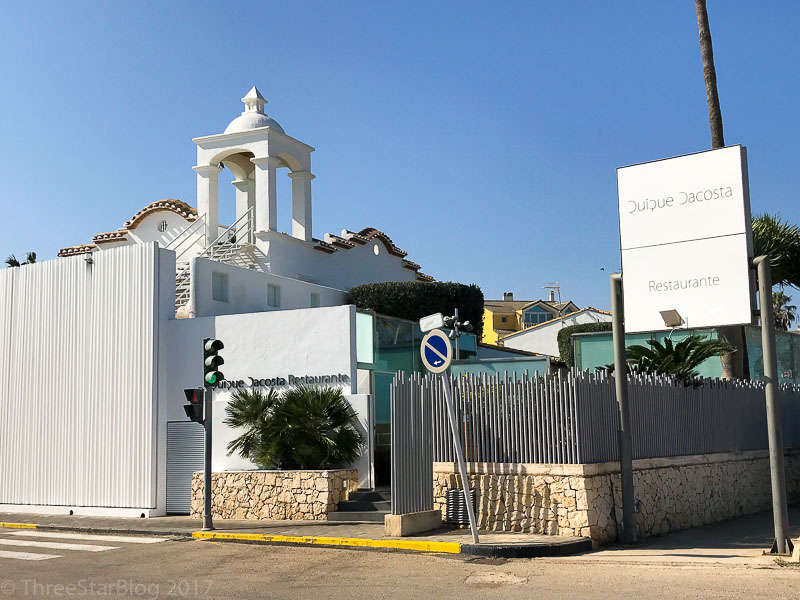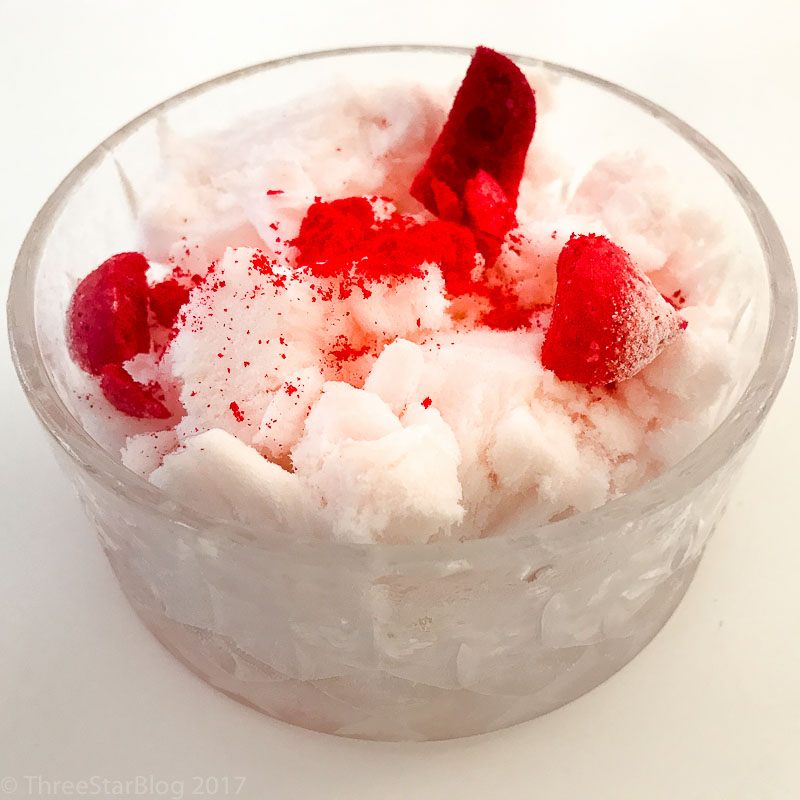Steps from an idyllic Mediterranean beach and nestled between the leafy citrus groves of the Spanish coastal countryside, you might be forgiven for mistaking Quique Dacosta's eponymous restaurant for a patrician seaside villa. Inside you will find what is easily one of the most experimental, exciting, and intellectual 3-star experiences the world has to offer.
Chef Quique Dacosta is full of nervous and enthusiastic energy. He floated into the room mid-meal and greeted each and every guest, offering photos and handshakes. He spoke constantly, his staff trailing a pace or two behind him to translate as he told the story of a dish or an ingredient. Just as quickly, he would vanish back into the kitchen.
DÉNIA, SPAIN (NEAR VALENCIA), FEBRUARY 2017
SERVICE: 8.5/10
FOOD: 8.5/10
PRICE PAID: $310PP (INCL. WATER, WINE, TAX, TIP- PRE-CHALLENGE)
VALUE/MONEY: 8.0/10
FINAL RATING: 8.5/10
Entering the restaurant's courtyard is a stereotypically Spanish affair, complete with Quixote-referential metal sculpture, tasteful glass surfaces, and smooth lines. The Guggenheim in Bilbao would be proud.
In one of my all-time favorite moves that three-stars make, we are given a seat outside on their gorgeous, sunny patio. Cava is offered moments later, and gratefully accepted.
The restaurant serves Recaredo's well-rated 2008 Brut Nature Gran Reserva; the Gran Reserva distinction indicates it has been aging on the lees for at least 30 months, which gives a rich brioche-y flavor. Made from the traditional blend of Xarel-lo, Parellada, and Macabeo grapes, a bottle retails for around $35 at home in the US. This 93-pointer was exceptionally bright, crispy, and citrus fruit-driven with strong biscuit flavors reminiscent of excellent Champagne.
As we relax and enjoy the seaside air, we are brought a dish called "Garlic and pepper." Rich and spicy with cardamom or turmeric; strong notes of dill and peanut, with a light zesty mussel from Valencia on bottom in a rich broth. 9/10, a great start.
Next, some king crab with pumpkin emulsion on the side. The pumpkin is from Benaguasil, and the shavings remind me in both texture and flavor of spaghetti squash. The king crab has a note of sweetness but the emulsion tastes like pumpkin soda with an odd, somewhat... shall we say "bacterial" flavor. The partial fermentation doesn’t play out as well as it might sound on paper. 6/10.
After lingering for a few moments in the February sun, we are welcomed inside and seated. Warm towels are brought over and "bell" chargers are resting in front of us, along with copper-colored mannequins' heads. Quirky.
The interior has the same dreamy, artsy feel to it as the exterior but the weirdness factor has been amped up another few notches. Lots of antenna'd alien statues and dramatic lighting. It’s like the parlor of your futuristic Uncle’s house. That uncle did a handstand in a mountain of coke in the 80s.
As we get comfortable with our surroundings, an alarmingly red plastic bag arrives that turns out to be a ceremonially-wrapped prawn from Dénia, the local region we happen to be sitting in. Boiled in seawater and served cold with a "tea" of chard and bisque on the side. Soft and sweet, the shellfish pulls apart with no effort at all and is incredibly tender. 9/10.
For a pairing, the restaurant selected the 2009 Chivite Blanco from the "Coleccion 125," a lovely, oaky Chardonnay with hints of lemon peel and a bouquet of citrus more broadly. It doesn't overpower the delicate fish and harmonizes nicely, with strong but not gushing acid.
Next, a small, polished ceramic stone with a million flickering tiny crystals that appear like a portal to space. On the stone, a summarization of traditional Dénia cuisine: clockwise from bottom left: red tuna belly, condensed Mullet roe, a “torta” of Ling roe, and octopus.
The tuna belly is rich and sinew and is nicely accentuated by some sugared kombu. It tastes like it is straight from the water, as good or better than any of the best sushi places I have visited in Japan (10/10). Same story with the condensed roe, which is flavorful and not dried like you might find in Japan, allowing it to retain much more freshness and flavor (8/10). The chip is a crunchy delight; cooked in vinegar and quite savory (8/10). The octopus is actually a touch dry (7/10) but spongy, but very flavorful. 8/10 overall.
With no other explanation, we are offered “crunchy plants” as a palate cleanser. Sure, why not.
Boy, don’t these look appetizing? As a preview to a later course, these immensely dense, larval-looking items are hauled over at significant effort for our viewing pleasure. No further explanation is offered.
A second palate cleanser is brought over, this time sake with yuzu in a martini glass. A curious move given the crunchy plants, but once again I find it hard to argue. Extremely bright notes of citrus and sugar, 9/10.
A comically-shaped “Pork nose” made of pâté and cracker arrived next. Rich and well-balanced; imagine an excellent cracker and charcuterie pairing and you’ve more or less got it. A truly delicious bread with a rich salting of seasonings. 8/10.
A better idea in theory than in practice, these deep-fried balls of codfish and sauce explode the moment you bite into them, exposing the piping-hot center of the beignet. The codfish taste is just a hair on the unfresh side, and it needed another 5 minutes to cool down before reaching our table. 7/10.
Another trompe l’oeil course called simply "Charcoal;" it’s actually meringue colored black by squid ink. The dried vegetable salsa offered alongside is shockingly flavorful and pairs perfectly with the flavors and textures of the meringue. 10/10, an incredibly creative and delightful dish.
This next course, the “Crushed Tomato,” is intended as a complex analogy to “the flavor versus the appearance of a dish.” Heavy and creamy, it tasted like really a good tomato dip. The kitchen made the cream from the dried tomato itself, and the tomato “skin” is tapioca. As a final step, they smash it with the back end of a spoon. Kind of reminded me of the “Oops, I dropped the lemon tart” dish at Osteria Francescana. 8/10.
I could not help laughing at the gamely dish in which this course was served. The lemonfish itself (a lovely whitefish) with a foam of very, very strong lemon balances almost perfectly. The color is partially from the lemon, but also partially from the aji amarillo spice that gives it a rich umami base. The foam also relies on orange, lemon, and ginger. A creative and playful dish that I loved. 9/10.
A really original take on Foie Gras- the “Cuba Libre Foie” has iced cubes of condensed lemon granité that offset the warm foie deliciously, and the acid of the citrus cuts through the fat of the foie with laser-like perfection. There’s even a small hint of rum. Yet another terrifically creative dish! 10/10.
A strange series of bedfellows came next; to the upper left, an enormous roasted leaf of kale served with rich sauce and a touch difficult to pick apart (8/10) is served alongside a Spanish delicacy; Iberian Castañuelas (literally the salivary glands of a pig) with flambéed oyster (8/10). The oysters and glands are very, very difficult to tell apart as they appear to have been tossed in the same skillet, but this extreme version of Surf & Turf is delightful. 8/10.
An interesting final savory course; Paella rice (Gleva rice, which like many things in Europe has a controlled origin) “between straw and mountain leaves” is served with a deep, rich, creamy sauce. The deep-fried “straw” provide a crunchy textural backbone to the dish. 9/10.
The first dessert is served- more of a transitional or palate-cleansing sort (big emphasis on that in this restaurant, for some reason). A snow of white peach with fresh peaches at bottom; bright, rich flavors, delightful. 9/10.
A collection of freeze-dried fruits with base of ice and draped with colorful flower petals is served next. Everything is crunchy and brittle, but the flavors remain bright and fresh. 8/10.
The only way to describe this dessert course titled “Moss” is that it tastes precisely like marshmallow cereal. If such a thing existed. 8/10.
Four hours in, a necessity: coffee. 9/10.
A few small epilogue courses as we get ready to depart- a cinnamon branch with prunes. Delightfully spicy and rich. 8/10.
As if every charmingly plated dish up to here hadn’t quite been enough, an edible rose served alongside the check. 9/10.
Quique Dacosta will stand out for a few reasons, but most of all for the extensive “R&D” lab they have behind the kitchen itself. The day we visited, they were experimenting with all sorts of different citrus varieties to find the perfect flavor for a new dish.
An incredible restaurant that seems equally focused on being clever as being good; this chef and his people are destined for great things.






































